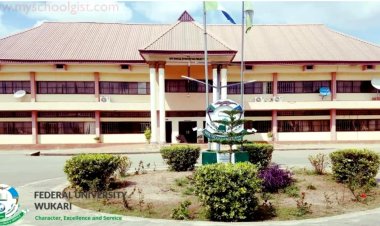Explore FUNAAB's Extensive Range of Courses and Admission Requirements for 2024/2025 Academic Session
The Federal University of Agriculture, Abeokuta (FUNAAB), renowned for its focus on agricultural education and research, offers a wide array of undergraduate and postgraduate courses across various disciplines.

The Federal University of Agriculture, Abeokuta (FUNAAB), renowned for its focus on agricultural education and research, offers a wide range of undergraduate and postgraduate courses across various disciplines. Aspiring students can find detailed information about the available courses, admission requirements, and cut-off marks to facilitate their decision-making process.
RECOMMENDED: Sky Farm Partners with FUNAAB to Boost Agricultural Education and Empower Graduates
FUNAAB boasts 351 academic programs, encompassing 30 undergraduate and 321 graduate programs. The institution is divided into several colleges, each offering specialized courses tailored to meet industry demands. For instance, the College of Agricultural Management and Rural Development (COLAMRUD) provides academic programs in Agricultural Administration, Economics, Extension, and Rural Development, among others. Similarly, the College of Animal Science and Livestock Production (COLANIM) offers programs in Animal Breeding, Nutrition, Physiology, and Production.
Furthermore, the College of Environmental Resources Management (COLERM) focuses on Aquaculture, Environmental Management, Forestry, and Water Resources Management. Other colleges, such as the College of Plant Science and Crop Production (COLPLANT), College of Biosciences (COLBIOS), and College of Physical Sciences (COLPHYS), offer programs in areas like Crop Protection, Biochemistry, Chemistry, Computer Science, and Mathematics.
Additionally, FUNAAB's College of Entrepreneurial and Development Studies (COLENDS) provides courses in Accounting, Banking, Business Administration, Economics, and Entrepreneurial Studies, among others. Meanwhile, the College of Food Sciences and Human Ecology (COLFHEC) offers programs in Food Science and Technology, Home Science, Hospitality, and Nutrition.
For those interested in engineering, FUNAAB offers various engineering courses, including Agricultural & Bio-Resources Engineering, Civil Engineering, Electrical Electronics Engineering, Mechanical Engineering, and Mechatronics Engineering.
READ ALSO: Senator Salisu Collaborates with FUNAAB to Enhance Food Security and Farming Methodology
To gain admission to FUNAAB, prospective undergraduate students must meet specific requirements, including possessing a minimum of five O'Level credit passes in relevant subjects, scoring a minimum of 160 marks in UTME, and participating in the FUNAAB Post-UTME screening exercise.
Similarly, postgraduate applicants are required to have a Bachelor's or Master's degree in a relevant field from FUNAAB or any recognized university, with a minimum Second Class (Upper Division) degree. Specific postgraduate courses offered by FUNAAB include Master of Agriculture, Doctor of Philosophy in various fields, Master of Forestry, and Master/Ph.D. in Aquaculture and Fisheries, among others.
While FUNAAB does not publicly announce departmental cut-off marks, interested applicants can contact the admissions office or their desired department for further inquiries.
Overall, FUNAAB's diverse range of academic programs, coupled with its stringent admission requirements, underscores its reputation as a premier institution in Nigeria, dedicated to fostering excellence in agricultural education and research.

 Chris Oyeoku Okafor
Chris Oyeoku Okafor 



